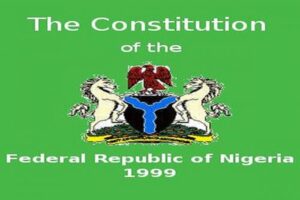 Political leaders and experts gathered in Lagos for a colloquium organized by The Patriots, titled “National Dialogue on the Future of Nigeria,” have reignited the call to replace the 1999 Constitution with a more suitable document.
Political leaders and experts gathered in Lagos for a colloquium organized by The Patriots, titled “National Dialogue on the Future of Nigeria,” have reignited the call to replace the 1999 Constitution with a more suitable document.
Recognizing the detrimental impact of an outdated legal framework, advocates argue that Nigeria’s progress is hindered by inadequate infrastructure, escalating insecurity, and mounting economic challenges. It is imperative that this call for change is taken seriously to avert further decline.
Emeka Anyaoku, former Commonwealth Secretary-General, emphasized the urgency of scrapping the current constitution, highlighting that the choices Nigeria makes in this regard will significantly shape its future. Drawing lessons from around the world, he stressed that successful pluralistic countries have embraced true federalism, granting substantial powers to the federating units.
Despite previous attempts by the 10th National Assembly to amend the constitution, these efforts have proven to be both financially draining and futile. The pattern of promising constitutional changes during political campaigns only to abandon them upon assuming office has been a recurring issue. It is encouraging to see figures like Babajide Sanwo-Olu, the host governor, and former leaders such as Olusegun Obasanjo and Goodluck Jonathan now advocating for true federalism, even after leaving office.
Nigeria, as a natural federation, faces numerous challenges due to the 1999 Constitution, which was hastily imposed by the military junta led by Abdulsalami Abubakar upon its exit from governance. The constitution’s provisions predominantly centralize political power, rendering it unsuitable for a country comprising over 250 ethnic nationalities and diverse beliefs. Instead of fostering integration, it perpetuates mutual suspicion and threatens national unity.
One of the most problematic aspects is the inclusion of 68 items on the Exclusive Legislative List, including the establishment of a single federal police force. This has contributed to a state of anarchy, with rampant incidents of mass kidnappings, banditry, terrorism, robbery, oil-related crimes, and conflicts involving Fulani herdsmen. Violence under the current dispensation has already claimed numerous lives, with recent incidents such as the massacre of 16 troops in Delta State on March 14 raising alarming concerns.
In contrast, other pluralistic countries have effectively implemented devolved policing systems. For example, Germany has three federal police forces, and each state within the United States operates its own police force alongside the federal FBI. Countries like Australia, Belgium, Brazil, Canada, Sweden, and Switzerland also embrace devolved policing models.
Furthermore, unlike the 1963 Republican Constitution, which allowed regions to retain 50 percent of their income and contribute the rest to the central government, the current constitution lacks provisions for fiscal federalism. Consequently, it perpetuates divisiveness by prioritizing the sharing of states’ resources.
The consequences of these shortcomings are evident in Nigeria’s ranking as the 15th most fragile state out of 177 countries, according to the Fund for Peace’s 2023 report, with a high fragility index of 98.00. The global average fragility index for the same year was 65.3.
Relying heavily on revenue sharing, many states have become dependent and unproductive. A survey conducted by Economic Confidential revealed that only seven out of the 36 states are financially viable without federal allocations. Despite this situation, some factions are advocating for the creation of additional states.
Instead of engaging in costly and divisive constitutional amendments, it is imperative for the National Assembly, the 36 governors, and President Bola Tinubu to convene a people’s assembly and work towards the formulation of a truly federal constitution that can address the country’s challenges before the situation worsens.

